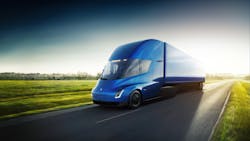Understanding the TCO of electric trucks
By Muffi Ghadiali
There is no one right way to determine the total cost of ownership (TCO) of any asset, including battery electric vehicles.
There are some obvious hard costs like the price of the vehicle itself and the cost of electricity. However, there are also soft costs including things like corporate image and driver satisfaction that should be included in the calculation.
It starts with the equipment
Of course, any TCO calculation has to start with the price of the equipment itself. When it comes to an electric truck, manufacturers are quoting numbers in the $150,000-to-$200,000 range. However, as with many new technologies there may be grants, incentives or tax breaks available to encourage the adoption of new more energy efficient vehicles. Any incentives need to be factored into the cost equation.
Along with the initial purchase price is the cost of maintaining the vehicles. Electric vehicles have fewer moving parts than diesel-powered vehicles, so it may need less maintenance. Battery electric vehicles may extend preventive maintenance schedules for brakes and tires, as the use of regenerative braking systems should result in less wear.
However, battery replacement has to be considered. It is likely that as battery electric vehicles gain acceptance and see more widespread use, the cost of batteries will come down.
Part of the cost discussion about the vehicle needs to include duty cycle, including temperature in which the vehicle will be operating. In addition, average miles, maximum daily miles, and total miles the vehicle will travel annually must be considered.
Fleets need to determine how long they intend to keep the vehicle, and then project what its value will be at trade-in. This can be very difficult to do, as there is not a large enough quantity of electric vehicles on the road to establish residual cost trend information.
Items like insurance, permits and licenses should be included in any cost calculation, although they are likely to be on a par with what a fleet is paying for its diesel-powered vehicles.
Getting it fueled
Fueling costs are another big consideration with any commercial vehicle. For most fleets operating diesel-powered trucks, fuel represents 22% of operating costs. While diesel fuel prices can fluctuate, price changes usually occur on a weekly basis.
With electric power, the cost of electricity can change depending on time of day and a concept called peak demand hours. Managing the charging of electric vehicles can have a significant impact on what a fleet’s charging costs will be.
Another factor in the TCO calculation is the cost of installing charging infrastructure. This cost can vary widely depending on a variety of factors including the number of electric trucks, time available to charge the trucks, the existing infrastructure, and the local grid’s existing capacity.
The number of trucks being charged will determine whether the fleet needs a standard Level 2 charger and minimum upfront investment or whether it will need to invest in DC Fast Charging (DCFC) chargers and upgrade its transformer and distribution lines.
In its report Medium-Duty Electric Trucks: Cost of Ownership, the North American Council for Freight Efficiency (NACFE), cited estimates for Level 2 chargers at $5,000 to $7,000, and for DCFCs at $35,000 and higher.
Fleets will need to get their utility company involved in this process — the sooner they do it the better off they will be. Infrastructure costs will vary based on the number of trucks in the fleet and the existing electric infrastructure.
There are also the costs of the batteries themselves. Fleets need to answer questions about battery efficiency and expected life of the batteries before they need to be replaced. Battery life depends on factors such as ambient temperature, depth of discharge, recharging cycles and charging levels. The general consensus today is that batteries will need to be replaced once they reach 80% of their new capacity.
Don’t forget the soft costs
Soft costs are not rigidly defined but do impact the total cost of operation. Each fleet has to determine which soft costs it wants to include in its calculation.
The TCO calculator in NACFE’s report suggests determining value for changes to driver retention costs, changes to technician retention costs, changes to emissions compliance costs, changes to brand image and changes to other overhead factors.
Determining the TCO for electric trucks can be tricky with several of the factors still wildly variable. Make sure to consider all these factors when calculating TCO and have a better understanding of the investment.
_____________________________________________________
Muffi Ghadiali is founder and CEO of Electriphi Inc., a developer of EV fleet and energy management solutions. Previously he was Senior Director at ChargePoint and led product management for hardware and software for DC Fast Charging Solutions. Electriphi is based in San Francisco.

